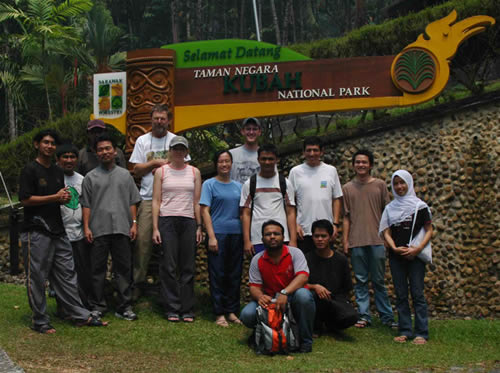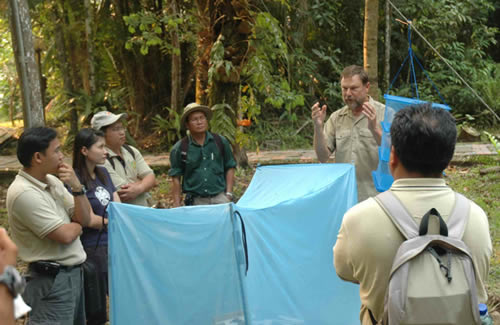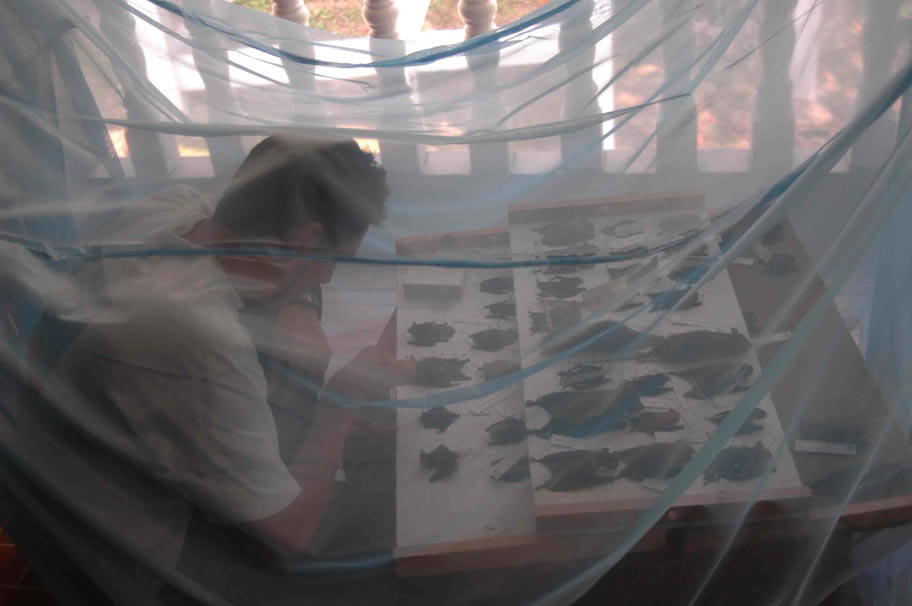Mammal Species Diversity in Malaysia
 The Natural Science Research Laboratory first began collaborative efforts in Malaysia
in 2006. This effort is between the NSRL and Universiti Malaysia Sarawak (Professor
Dr. M. T. Abdullah) through a memorandum of understanding between both institutions
in developing long term educational goals. Other collaborators include the Department
of Wildlife and National Parks (Dr. Sivanathan Ellagupillay) and Sabah Park (Dr. Marklarin
Lakim). A joint three-week field expedition between TTU and UNIMAS was conducted to
sample bats and mammal species diversity in Malaysia. The survey sampled five localities
during August 2006, including one in Peninsular Malaysia and four in Borneo.
The Natural Science Research Laboratory first began collaborative efforts in Malaysia
in 2006. This effort is between the NSRL and Universiti Malaysia Sarawak (Professor
Dr. M. T. Abdullah) through a memorandum of understanding between both institutions
in developing long term educational goals. Other collaborators include the Department
of Wildlife and National Parks (Dr. Sivanathan Ellagupillay) and Sabah Park (Dr. Marklarin
Lakim). A joint three-week field expedition between TTU and UNIMAS was conducted to
sample bats and mammal species diversity in Malaysia. The survey sampled five localities
during August 2006, including one in Peninsular Malaysia and four in Borneo.
 A total of 272 specimens representing at least 54 species of bats and rodents were
recorded. A taxonomic list of the specimens collected during the TTU-UNIMAS Sowell
Expedition, along with conservation status, collecting locality, and associated measurements
(Appendix), is available for download at http://www.nsrl.ttu.edu/publications/opapers/ops/OP281.pdf.
Collection of this many species with their respective genetic material (including
karyotypic data from 169 individuals) and georeferenced voucher specimens represents
a valuable opportunity to understand the biodiversity and species limits of the Malaysian
mammalian fauna. Furthermore, this collaborative effort between the Universiti Malaysia
Sarawak and Texas Tech University resulted in tissues from all individuals being archived
at both universities, which better protects these valuable resources.
A total of 272 specimens representing at least 54 species of bats and rodents were
recorded. A taxonomic list of the specimens collected during the TTU-UNIMAS Sowell
Expedition, along with conservation status, collecting locality, and associated measurements
(Appendix), is available for download at http://www.nsrl.ttu.edu/publications/opapers/ops/OP281.pdf.
Collection of this many species with their respective genetic material (including
karyotypic data from 169 individuals) and georeferenced voucher specimens represents
a valuable opportunity to understand the biodiversity and species limits of the Malaysian
mammalian fauna. Furthermore, this collaborative effort between the Universiti Malaysia
Sarawak and Texas Tech University resulted in tissues from all individuals being archived
at both universities, which better protects these valuable resources.
 Faisal Ali Anwarali Khan received a Master of Science degree (2008) and a PhD (2013)
in Zoology from TTU based on these collaborative research efforts.
Faisal Ali Anwarali Khan received a Master of Science degree (2008) and a PhD (2013)
in Zoology from TTU based on these collaborative research efforts.
A second field expedition to Malaysia is tentatively scheduled for January 2010. During this field expedition a karyotyping workshop will be conducted by Dr. Robert J. Baker for a group of students (primarily postgraduate students) at UNIMAS. Additional field expeditions to Malaysia took place in 2010 and 2012.
Natural Science Research Laboratory
-
Address
Museum of Texas Tech University, 3301 4th street, Lubbock, TX 79409 -
Phone
806.742.2486 -
Email
nsrl.museum@ttu.edu
